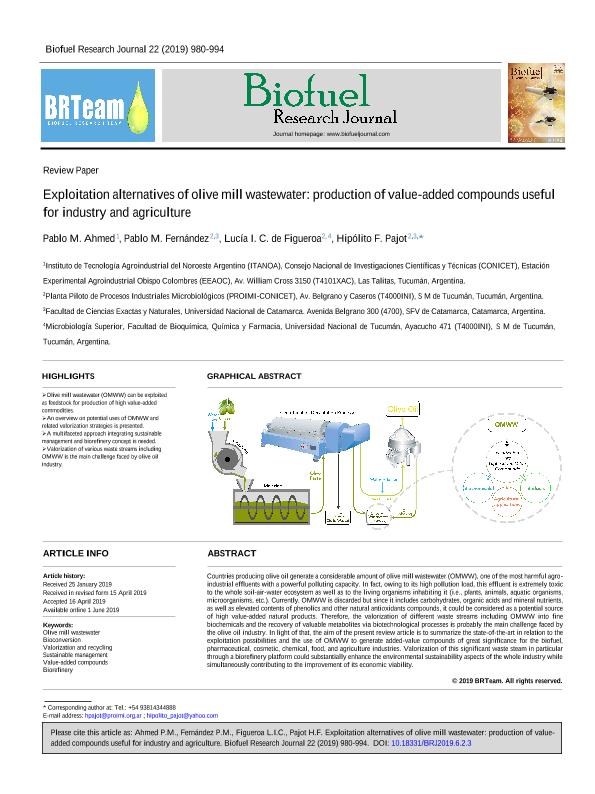Mostrar el registro sencillo del ítem
dc.contributor.author
Ahmed, Pablo Miguel

dc.contributor.author
Fernández, Pablo Marcelo

dc.contributor.author
Castellanos, Lucia Ines

dc.contributor.author
Pajot, Hipolito Fernando

dc.date.available
2020-11-06T14:00:57Z
dc.date.issued
2019-06
dc.identifier.citation
Ahmed, Pablo Miguel; Fernández, Pablo Marcelo; Castellanos, Lucia Ines; Pajot, Hipolito Fernando; Exploitation alternatives of olive mill wastewater: Production of value-added compounds useful for industry and agriculture; Green Wave Publishing; Biofuel Research Journal; 6; 2; 6-2019; 980-994
dc.identifier.uri
http://hdl.handle.net/11336/117776
dc.description.abstract
Countries producing olive oil generate a considerable amount of olive mill wastewater (OMWW), one of the most harmful agroindustrial effluents with a powerful polluting capacity. In fact, owing to its high pollution load, this effluent is extremely toxic to the whole soil-air-water ecosystem as well as to the living organisms inhabiting it (i.e., plants, animals, aquatic organisms, microorganisms, etc.). Currently, OMWW is discarded but since it includes carbohydrates, organic acids and mineral nutrients,as well as elevated contents of phenolics and other natural antioxidants compounds, it could be considered as a potential source of high value-added natural products. Therefore, the valorization of different waste streams including OMWW into fine biochemicals and the recovery of valuable metabolites via biotechnological processes is probably the main challenge faced by the olive oil industry. In light of that, the aim of the present review article is to summarize the state-of-the-art in relation to the exploitation possibilities and the use of OMWW to generate added-value compounds of great significance for the biofuel, pharmaceutical, cosmetic, chemical, food, and agriculture industries. Valorization of this significant waste steam in particular through a biorefinery platform could substantially enhance the environmental sustainability aspects of the whole industry while simultaneously contributing to the improvement of its economic viability.
dc.format
application/pdf
dc.language.iso
eng
dc.publisher
Green Wave Publishing
dc.rights
info:eu-repo/semantics/openAccess
dc.rights.uri
https://creativecommons.org/licenses/by-nc-sa/2.5/ar/
dc.subject
OLIVE MILL WASTEWATER
dc.subject
BIOCONVERSION
dc.subject
BIOREFINERY
dc.subject
VALORIZATION AND RECICLYNG
dc.subject.classification
Bioproductos, Biomateriales, Bioplásticos, Biocombustibles, Bioderivados, etc.

dc.subject.classification
Biotecnología Industrial

dc.subject.classification
INGENIERÍAS Y TECNOLOGÍAS

dc.title
Exploitation alternatives of olive mill wastewater: Production of value-added compounds useful for industry and agriculture
dc.type
info:eu-repo/semantics/article
dc.type
info:ar-repo/semantics/artículo
dc.type
info:eu-repo/semantics/publishedVersion
dc.date.updated
2020-05-05T16:02:29Z
dc.identifier.eissn
2292-8782
dc.journal.volume
6
dc.journal.number
2
dc.journal.pagination
980-994
dc.journal.pais
Canadá

dc.journal.ciudad
New Brunswick
dc.description.fil
Fil: Ahmed, Pablo Miguel. Consejo Nacional de Investigaciones Científicas y Técnicas. Centro Científico Tecnológico Conicet - Tucumán. Instituto de Tecnología Agroindustrial del Noroeste Argentino. Provincia de Tucumán. Ministerio de Desarrollo Productivo. Estación Experimental Agroindustrial "Obispo Colombres" (p). Instituto de Tecnología Agroindustrial del Noroeste Argentino; Argentina
dc.description.fil
Fil: Fernández, Pablo Marcelo. Consejo Nacional de Investigaciones Científicas y Técnicas. Centro Científico Tecnológico Conicet - Tucumán. Planta Piloto de Procesos Industriales Microbiológicos; Argentina. Universidad Nacional de Catamarca. Facultad de Ciencias Exactas y Naturales; Argentina
dc.description.fil
Fil: Castellanos, Lucia Ines. Consejo Nacional de Investigaciones Científicas y Técnicas. Centro Científico Tecnológico Conicet - Tucumán. Planta Piloto de Procesos Industriales Microbiológicos; Argentina. Universidad Nacional de Tucumán. Facultad de Bioquímica, Química y Farmacia; Argentina
dc.description.fil
Fil: Pajot, Hipolito Fernando. Consejo Nacional de Investigaciones Científicas y Técnicas. Centro Científico Tecnológico Conicet - Tucumán. Planta Piloto de Procesos Industriales Microbiológicos; Argentina. Universidad Nacional de Catamarca. Facultad de Ciencias Exactas y Naturales; Argentina
dc.journal.title
Biofuel Research Journal
dc.relation.alternativeid
info:eu-repo/semantics/altIdentifier/url/https://www.biofueljournal.com/article_88068.html
dc.relation.alternativeid
info:eu-repo/semantics/altIdentifier/doi/https://dx.doi.org/10.18331/BRJ2019.6.2.4
Archivos asociados
